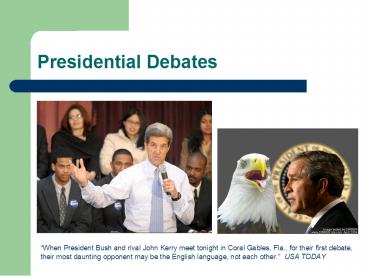Presidential Debates - PowerPoint PPT Presentation
1 / 33
Title:
Presidential Debates
Description:
CNN.com. Research:The First Step In the Public Relations Planning Process. PR Is About Listening ... ABC, NBC, CBS, CNN, NPR and others. Dialog ... – PowerPoint PPT presentation
Number of Views:183
Avg rating:3.0/5.0
Title: Presidential Debates
1
Presidential Debates
When President Bush and rival John Kerry meet
tonight in Coral Gables, Fla., for their first
debate, their most daunting opponent may be the
English language, not each other. USA TODAY
2
CNN.com
3
ResearchThe First Step In the Public Relations
Planning Process
- PR Is About Listening
4
Research Defined
Research is the controlled, objective, and
systematic gathering of information for the
purpose of describing and understanding.
Glen Broom and David Dozier, San Diego State
University
5
Reason For Using Research
- To make sure your program is the best it can be
- That what you are doing is on target
- That you are speaking to the right audience
- That you are using the right messages
- Evaluation will tell you whether you were right
or wrong
6
What Type of Research Do I Use?
- Subject
- Situation
- Time
- Budget
- Perceived importance
7
Before Deciding On Research Design
- What is the problem?
8
Before Deciding On Research Design
- What kind of information is needed?
9
Before Deciding On Research Design
- How will the results of the research be used?
10
Before Deciding On Research Design
- What specific public(s) will be the subject of
the research?
11
Before Deciding On Research Design
- Should we outsource?
- How soon the do we need the results?
- How much will this research cost us?
12
Research
- PR departments spend 3-5 percent of budget on
research - Most experts would like to see that go up to 10
percent.
13
Research Credibility
14
Define Audiences
Education
Lifestyles
Demographics
Consumption Patterns
15
Keep Management In Touch
- Management is isolated
- George Bush Scanners
- Reality check
16
Using research
- Test messages
- Car Pooling
- Message 1 Saving time and money
- Message 2 Air quality or environmental concerns
17
Using Research
- Bombing Iraq
- Message 1
- Message 2
18
Prevent Crises
- 90 percent of organizational crises caused by
INTERNAL operational problems
19
Monitor Competition
- Conduct surveys of consumers
- Track your competition
20
Facts, Figures WOW!
21
Research Techniques
- Secondary research
- 75 percent of practitioners conduct this type of
research - Known as casual research
22
(No Transcript)
23
Secondary Research Sources
24
Primary Research
- In-depth interviews
- Focus groups
- Surveys
- Polls
- Statistical tabulations
25
Archival information
- Organizational policy statements
- Employee newsletters/magazines
- Past speeches
- News clips
- Marketing stats
- Past PR reports
26
Online databases
- Burrelles Broadcast Database
- Full-text transcripts of radio/TV programs within
24 hours after transmission - ABC, NBC, CBS, CNN, NPR and others
- Dialog
- Contains 45 databases with 2,500 magazines,
journals and newsletters
27
Online databases
- Dow Jones News/Retrieval
- Business library
- 45 million documents
- Sourced from 3,000 business/financial pubs
- Nexis/Lexis
- 8 million full-text articles
- Sourced from 125 magazines, newspapers and news
services
28
Online networks
America Online
Microsoft Network
Prodigy
CompuServe
29
Available on the internet
- Corporations
- Nonprofits
- Trade groups
- Special interest groups
- Foundations
- Universities
- Think tanks
- Government agencies
- Government officials
- The White House
- Elected officials
30
Be Careful
31
Other Methods
- Content Analysis
- Applied to news stories
- How many times is key message mentioned?
- Positive, negative, or neutral coverage
32
Other Methods
- Interviewing
- In mallsintercept interviewing
- Not scientific, but reflects current thinking,
exposure to key messages - Last 2-5 minutes
33
Other Methods
- Focus Groups
- Alternative to individual interviewing
- Used in advertising, marketing, and public
relations to identify attitudes and motivations































